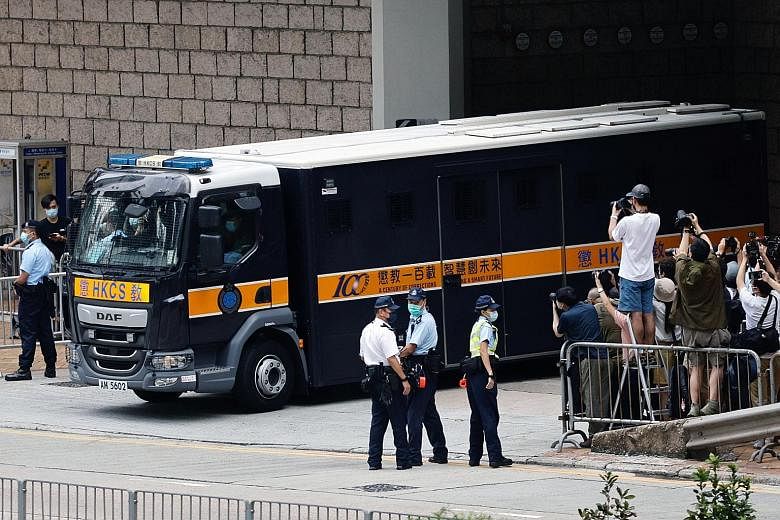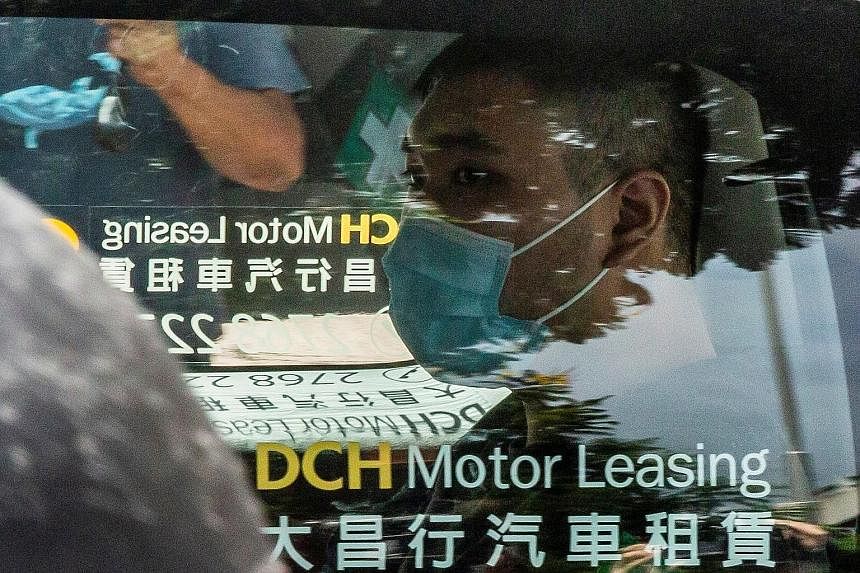HONG KONG • The first person convicted under Hong Kong's national security law was jailed for nine years yesterday for terrorist activities and inciting secession, judges said, in a watershed ruling with long-term implications for the city's judicial landscape.
Former waiter Tong Ying-kit, 24, was accused of driving his motorcycle into three riot police officers during a protest last year while carrying a flag with the protest slogan "Liberate Hong Kong. Revolution of our times".
Tong's lawyer, Mr Clive Grossman, told reporters that the defence would appeal against both the verdict and the sentence.
Judges Esther Toh, Anthea Pang and Wilson Chan - picked by the city's Chief Executive Carrie Lam to hear national security cases - had ruled on Tuesday that the slogan was "capable of inciting others to commit secession".
The judges yesterday sentenced Tong to 61/2 years for inciting secession and eight years for terrorist activities. Of these, 21/2 years will run consecutively, resulting in a total term of nine years.
"We consider that this overall term should sufficiently reflect the defendant's culpability in the two offences and the abhorrence of society, at the same time, achieving the deterrent effect required," they said in a written judgment.
Human rights groups have criticised Tong's conviction, saying that it imposes new limits on free speech, as well as the precedents set by the trial, which they say contrast with Hong Kong's common law traditions.
"The sentencing of Tong Ying-kit to nine years confirms fears that the national security law is not merely a tool to instil terror into government critics in Hong Kong; it is a weapon that will be used to incarcerate them," said Amnesty International's Asia-Pacific regional director Yamini Mishra in a statement.
The Hong Kong government did not respond to a request for comment on the accusations, but Secretary for Security Chris Tang told reporters he welcomed the sentence. "The court has ruled that the slogan connotes Hong Kong independence," Mr Tang said. "If you say this slogan, you need to bear the consequences."
Tong was denied bail in line with a provision of the national security law that puts the onus on the defendant to prove he would not be a security threat if released. Tong also did not get a trial by jury because of "a perceived risk of the personal safety of jurors and their family members or that due administration of justice might be impaired".
The Hong Kong and Chinese authorities have repeatedly said all the rights and freedoms promised to the former British colony upon its return to Chinese rule in 1997 were intact, but that national security was a red line. All cases have been handled in accordance with the law, both governments have said.
At a pre-sentencing hearing on Thursday, Mr Grossman pleaded for lenience, saying any incitement was of a minor nature and Tong was a decent young man who did something stupid.
Tong, who pleaded not guilty to all charges, was also found guilty of terrorist activities, with judges saying on Tuesday that his motorcycle was potentially a lethal weapon and his actions "a deliberate challenge mounted against the police".
In their reasons for sentencing, the judges wrote: "Whoever carries out terrorist activities with a view to intimidating the public in order to pursue political agenda, whatever that is, should be condemned and punished.
"But when the political agenda is secessionist in nature, it is our view that there is an added criminality in that such an agenda is seeking to undermine national unification."
A charge of dangerous driving causing grievous bodily harm was not considered. Tong's trial focused mostly on the meaning of the slogan, which was ubiquitous during Hong Kong's 2019 pro-democracy protests.
The arguments over its interpretation drew on topics such as ancient Chinese history, the US civil rights movement and Malcolm X.
The judges said on Tuesday they were "sure that the defendant fully understood the slogan to bear the meaning of Hong Kong independence".
Tong did not testify during the trial.
REUTERS


